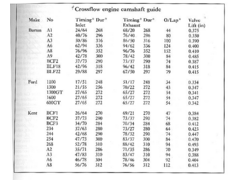If you're lucky a pic of some cam specs should be below.


Rescued attachment Xflowcam.jpg

I'm building a Locost to race in the 750MC series, and the doner car (according to the log book) was a 1300 Ghia.
I thought the Ghia had all 1300GT bits, but the gearbox is a plain vanilla 1300 (thanks to Des for the "how to identify" info).
I'm concerned now that the engine is the 54HP 1300 rather than the 74HP GT version (bad news if I don't want to be at the back of the grid).
I understand the main difference between it, and the 1300GT, is the camshaft. Is this correct?
If so, how, with the camshaft out of the engine, can I check if it's the higher HP GT version? Are there some ID marks I can refer to? The Haynes
manual mentions some colour coding, but I can't see anything on mine.
Thanks
RJ
Yes it is the main difference (apart from the carb).
You'll struggle to tell the difference between a 'standard' 1300 and a 1300 GT cam if it's out of the engine imo - easiest way to
do it is with the cam (and followers 1 and 2 ) and crank in the engine and connected as they would normaly be by the timing chain - then with a timing
wheel on the end of the crank and a dial gauge on the push rod you've just placed on follower one compare the opening and closing positions and
max lift with the ones in the Haynes manual, then if you want to be thorough check the figures on no. 2 follower as well.
Obviously you need a timing wheel and a dial gauge which is a pain if you have to buy them - I wouldn't dispair just yet though as there will
probably someone along in a minute to tell you that I'm talking nonsense and you can do it with a pipe cleaner and a small piece of sticky back
plastic........
you forgot the fairy liquid bottle for the timing disk
but seriously there is no easy way to identify the cam they were colour coded from the factory but this tends to go after 15 years or so. If you are
serious about the performance i suggest you get a new standard GT cam as the old one will more than likely be past its best by now.
Tim
1300GT should have a paint code on it. Think it's Red but will check from my info.
If you're lucky a pic of some cam specs should be below.


Rescued attachment Xflowcam.jpg
Close, it should have a paint ring of Red/White if it's a 1300GT
Provided the cam is only wiped off and not put through any solvent I've always found the paint marks on the cams I've come across.
OK it says paint rings but they are usually splodges of paint at the cam drive end in the gap between second and third lobes ISTR.
I concur though, that buying a new cam would be best.
There was some talk some while ago about how the front runners were using tuning companies who bought in loads and looked for the 'best'
standard spec cam.
Sometimes I wondered on this one, after all if you look at the specs there's only the few thou lift difference to distinguish a 1600 cam, but it
adds a small increase.
Before I get flamed I'm NOT suggesting anyone in race series would do such a thing. After all they can be stripped and checked by the
scrutineers.
The original front runner engines I believe were fully blueprinted to gain absolute specs, hard to achieve as a home builder.
Checked the cam but no sign of any paint marks - so looks like it's down to Cams-R-Us for me, unless someone knows a good alternative? Burton
Power I've been told are OK - anyone concur?
Should I also change out the cam followers at the same time?
cheers
RJ
Checked my old haynes's and the GT had larger inlet valves as well, if its a standard Ford cam the GT type had a cut out on the timing gear face where vanillas were flat faced.
Cheers Gas (not a Bristol Rovers supporter by any chance?  ),
),
In my Haynes it doesn't say anything about GT inlet valves being bigger, only that 1300 valves are approx 38mm dia.
Not sure what you mean about a cut out, but can't see anything on mine except a groove cut across the drive end bearing.